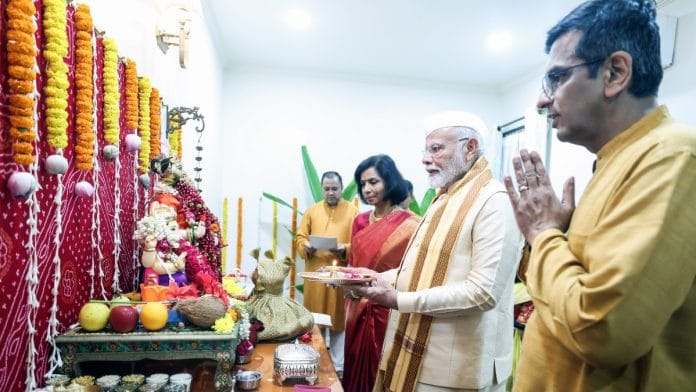New Delhi: Prime Minister Narendra Modi’s attendance at a Mahalaxmi and Ganpati Puja held at Chief Justice of India D.Y. Chandrachud’s residence here Wednesday has sparked a debate in legal circles over the separation of powers, with a section of former judges and senior advocates emphasising the importance of a “self-imposed Lakshman Rekha”.
At the same time, there were also those who argued that there was nothing wrong with the CJI hosting the Prime Minister in a “personal capacity”.
On Tuesday, visuals surfaced of Modi taking part in a Ganesh Aarti at Chandrachud’s residence, alongside the CJI and his wife.
Senior Supreme Court lawyers including Indira Jaisingh and Prashant Bhushan were among prominent voices from the legal community who criticised the Chief Justice over the interaction. “It sends a troubling signal to the judiciary, which is responsible for safeguarding citizens’ fundamental rights from the executive and ensuring the government operates within the bounds of the Constitution.” Bhushan told ThePrint Thursday.
Also Read: Jodhpur lawyer bearing delivery expenses of minor rape victim is ‘grateful the court chose him’
‘Will be perceived as if CJI is seeking post-retirement benefit’
Asked to comment, Justice R.S. Sodhi, a retired judge of the Delhi High Court who heard several high profile matters including the Jessica Lall case, said the visuals left a “sour taste” in the mouth.
“We have to maintain our distance from litigants, and the government is the biggest litigant. I can understand instances where the judiciary participates in national events—that’s a different matter altogether. In such cases, the Prime Minister or Chief Justice may be invited, which is appropriate. However, private pujas, dinners, and casual socialising, like a glass of wine here or whiskey there, do not align with the judiciary’s role and its relationship with its litigants,” he told ThePrint Thursday.
Sodhi said he was of the opinion that it is not appropriate for the Chief Justice of India to invite the Prime Minister for a puja. “And why would the Prime Minister decline? He is a politician. It’s the Chief Justice’s responsibility to safeguard his position and that of the judiciary.”
Stating that the interaction can be viewed as a “retirement plan” for the Chief Justice of India, Sodhi also expressed concerns about its impact on how the country views the Supreme Court’s decisions going forward.
“Now, it will be perceived as if Justice Chandrachud is seeking some kind of post-retirement benefit. I believe it’s already started to look like that, and that’s the problem. It should never look that way because it erodes confidence in the judiciary. I don’t know what the next judgment will say, but it may reflect in his next judgment. He may be too harsh or too right.”
He added, “Whatever it is, justice is an elusive concept. Justice must not only be done; it must be seen to be done.”
Justice Asok Kumar Ganguly, a retired Supreme Court judge, held a similar opinion. Ganguly said he was “shocked” and “surprised” to see visuals of Modi attending a puja at the CJI’s residence.
“During my tenure, I worked with two honourable Chief Justices, K.G. Balakrishnan and S.H. Kapadia, and I am certain that such things were never associated with them. While they observed social rituals in their private homes, high-ranking dignitaries from the central government were never invited. The same applies to my colleagues who became the Chief Justice; Altamas Kabir and T.S. Thakur, same can be said about them, in their houses, where I frequented as a colleague,” Ganguly told ThePrint.
He added, “It’s an unwritten rule that some distance must be maintained to preserve public confidence in the judiciary.” Ganguly, who also served as chairman of the West Bengal Human Rights Commission and was part of benches that delivered judgements in crucial matters like the 2G spectrum case, also said these were matters where both sides (executive and judiciary) should have shown “exemplary restraint”.
“In a democracy, judges hold a unique position. The first attribute and requirement of justice is the confidence of the people. That is the hallmark of a democratic system.”
Retired Justice Madan Lokur, one of the five judges who had held a press conference against the then CJI Dipak Misra in 2018, said that he was more concerned about the consequences.
ThePrint also reached a former Chief Justice of India who refused to comment, stating instead that this was a private matter.
‘Can’t CJI have a personal life?’
At the same time, Shiv Narayan Dhingra, a former judge of the Delhi High Court, said he saw nothing wrong with the CJI inviting the Prime Minister to the former’s residence “in his personal capacity”.
He added: “Can’t a CJI have a personal life? … Why can’t you have faith in the Chief Justice? He had a long career as a judge. Nobody has ever pointed a finger at him and now he is being doubted just because he invited somebody at a puja. This is shameful for those who are criticising it.”
The former judge also took a dig at senior advocates, stating that many of them attend judges’ functions and invite judges to their personal events— the next day, they are in court arguing cases before the same judges.
(Edited by Amrtansh Arora)
Also Read: Ex-CJI UU Lalit says new criminal laws ‘the way ahead’, commends provision on mob lynching






